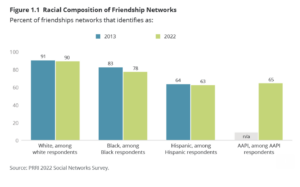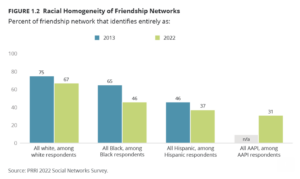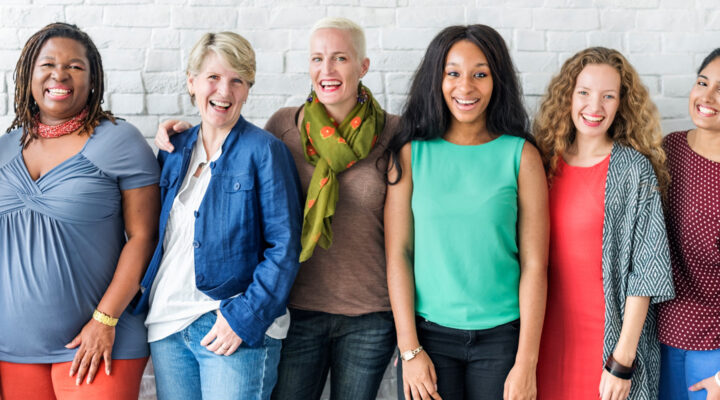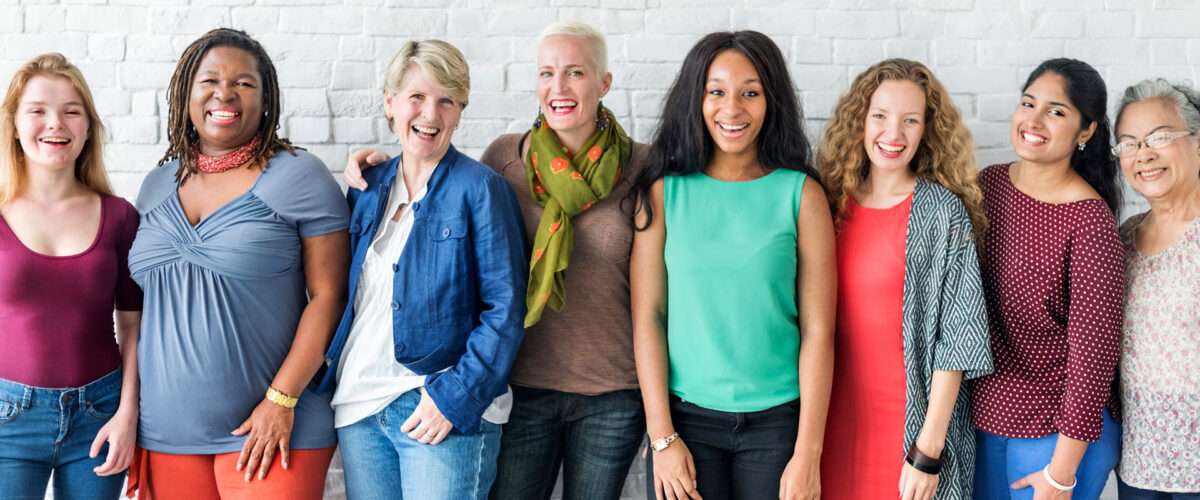A majority of Americans associate most closely with people who look, think, vote and worship like them, according to new research by Public Religion Research Institute.
“Across demographic groups, Americans’ core friendship networks tend to be dominated by people of their same race or ethnic background — particularly white Americans, among whom 90% of their friendship networks are also white,” the research group found in its May 2022 study, “American Bubbles: Politics, Race, and Religion in Americans’ Core Friendship Networks.”

PRRI also documented Americans’ propensity to subdivide along political and religious lines, by the embrace of ideologies such as Christian nationalism or the preference for pluralism. The composition of friendship networks also was found to predict attitudes toward immigrants, authentic American citizenship, systemic racism and whether or not the nation should embrace diversity.
“White Christian groups stand out in their assessments of what makes someone truly American, especially on attributes where there is less consensus,” the group reported. “Around three-quarters of white evangelical Protestants say it is at least somewhat important to believe in God to be truly American (77%), compared to a slim majority of white Catholics (53%) and almost half of white mainline Protestants (49%). Seven in 10 Black Protestants (71%) and Hispanic Catholics (70%) say belief in God is at least somewhat important to being truly American, while just 37% of other non-Christian religious Americans and 14% of religiously unaffiliated Americans say the same.”
But the measure of what makes a true American and other opinions are shaped by core social networks which, PRRI found, have shifted racially since similar polling was conducted in 2013.
“Among white Americans, 90% of people comprising their social networks are also white, similar to 2013 (91%). Among Black Americans, 78% of people in their social networks are also Black, a notable decrease from 83% in 2013. Among Hispanic Americans, 63% of the people who comprise their core social networks are also Hispanic, while about one in four (26%) are white, similar to 2013 (64% and 19%, respectively).”

The trend demonstrates that the presence of social networks made up of entirely one race are diminishing, PRRI explained. “In 2022, 67% of white Americans have networks that are entirely white, compared to 75% in 2013. Black Americans’ networks have diversified most, with less than half (46%) today composed entirely of people who are also Black, compared to 65% in 2013. Hispanics are also more likely to report a racially mixed network today than they were in 2013: 37% of Hispanics report that their social networks are comprised entirely of other people who also identify as Hispanic, compared to 46% in 2013.”
But partisanship tends to skew that development.
“Notably, political partisans have sharply contrasting core social networks in terms of their racial composition,” PRRI reported. “The core friendship networks of Republicans are on average 83% white, compared to 67% white among independents and 53% white among Democrats. There are slight differences between white Republicans and white Democrats. On average, the core social network of white Democrats is 90% white, while the core social network of white Republicans is 93% white.”
Religion also cultivates homogeneity in relationship circles, PRRI said. “Americans are also much more likely to associate with people who share their religious background. Nearly two-thirds (65%) of Protestants’ social networks are also Protestants (similar to 68% in 2013), and 59% of individuals in Catholics’ social networks also identify as Catholic (a slight decrease from 72% in 2013). Similarly, 58% of the social networks of Americans who belong to non-Christian religions also belong to a non-Christian religion (up from 38% in 2013).”
The racial, religious and political makeup of core social circles has a bearing on how Americans’ perceive the issues impacting their nation’s condition and direction, PRRI said.
“The composition of Americans’ friendship networks, especially the presence of homogeneous networks, strongly impacts the views of respondents on questions about American identity, pluralism, Christian nationalism and the changing demographics of the country. Generally speaking, among those who are the least supportive of racial and religious pluralism, the presence of just one person who does not share their attributes in terms of party, race or religion has a significant impact on their views.”
Almost half of Americans (49%) said U.S culture and life have improved since the 1950s, versus 50% who say it has changed for the worse.
“Americans whose social networks only include Democrats (66%) are much more likely than those whose networks only contain Republicans (33%) or independents (44%) to say that American culture and way of life have changed for the better since the 1950s. Americans with politically diverse social networks are evenly divided (49% say things have improved, 50% say things have worsened).”
Social networks consisting of strong religious affiliations likewise contributed to attitudes about Christian nationalism.
“Social networks consisting of strong religious affiliations likewise contributed to attitudes about Christian nationalism.”
“Nearly seven in 10 white evangelical Protestants (68%) and Hispanic Protestants (68%), along with 58% of African American Protestants and 56% of other nonwhite Protestants, agree that God has a special role for America. Less than half of every other major religious group agrees with this statement, including 46% of white mainline Protestants, 46% of white Catholics, 44% of Hispanic Catholics, 34% of Jewish Americans, 35% of those identifying with other non-Christian religions, and only 16% of religiously unaffiliated Americans.”
Beliefs about the importance of pluralism also were predictable based on the makeup of core social networks. PRRI found that about 50% of Americans said they “mostly agree” the U.S. should be diverse and consist of adherents to multiple faiths. Three in 10, or 31%, placed themselves in the mid-range of that belief while 18% preferred the U.S. be home primarily to Christians.
“Support for a religiously pluralistic country among Republicans — the partisan group least likely to express a preference for religious pluralism — is relatively similar among Republicans whose social networks include only Republicans (26%) compared to those whose networks include at least one non-Republican (30%).”
Related articles:
Brian Flores, the Rooney Rule and some lessons for churches seeking diversity | Opinion by Maina Mwaura and Christopher Harris


